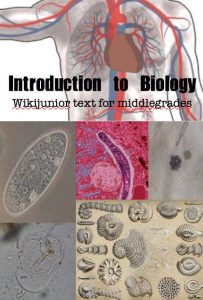 In an Introduction to Biology, a textbook for upper elementary and middle grade, published by Wikijunior, we learn about a range of topics, including a detailed look at the human body and cells, and an overview of kingdoms, archaea, bacteria, protists, fungi, plants, and animals.
In an Introduction to Biology, a textbook for upper elementary and middle grade, published by Wikijunior, we learn about a range of topics, including a detailed look at the human body and cells, and an overview of kingdoms, archaea, bacteria, protists, fungi, plants, and animals.
This text is available in creative commons (CC-BY-SA), so you are free to share and reuse pretty much unrestricted, as long as attribution is provided and any resulting material is published the same way. This means the material is perfect for creating new projects or books of your own.
See more books like this in our Wikibooks category.
See more books about science in our Science category.
Sample text from Introduction to Biology
Biology is the study of Life. It helps us understand many things, such as how our body works, how our body keeps warm, and what we are made of. Biology is very important to know. Some subjects in Biology are Genetics, Zoology, Botany, and Ecology.
A Biologist is someone who studies Biology.
Biology is the study of Life. It helps us understand many things, such as how our body works, how our body keeps warm, and what we are made of. Biology is very important to know. Some subjects in Biology are Genetics, Zoology, Botany, and Ecology.
A Biologist is someone who studies Biology.
0.1 What is life?
Living things are different from things that are not alive. It is usually easy to tell what is living and what is not, except with really small “microscopic” life forms and colorless, lifeless-looking mosses.
Here are some properties of living things. Some non-living things can have some of these properties.
Living things can change and grow. However, volcanoes also change and grow.
Living things can move. However, the wind is moving air, and water always moves downhill.
You probably want to know how plants can move. They can grow, and sometimes move more rapidly than that, in response to things such as the sun or water. One example is that sunflowers will turn during the course of the day so that they are always facing the sun. Another example is that if a plant gets tipped over, it will want to turn upwards.
Living things can reproduce. That is they can produce copies of themselves, over and over. This is the most important difference between living and non-living things.
In order to reproduce, living things need nutrition, that is chemicals and energy sources in order to assemble the materials needed to reproduce themselves. In this process , living things must excrete waste. Waste is material which is of no use, or harmful.
Animals, bacteria, and plants are examples of living things. Rivers, mountains, oceans, and soil are examples of non-living things, but often they are homes for living things.
Cars and tables are not living things because they cannot reproduce themselves.
0.2 Levels of Life
Living things can be many sizes. Also, biologists organize the structures and groupings of living creatures according to size. A living creature is called an organism. Organisms can consist of single cells or multiple different types of cells grouped into tissues and organs. From small to large, these are how living things are grouped.
- Cells (1) – Most cells are only a few microns wide, so small they can only be seen with a microscope. A micron is one thousandth of a millimeter.
- Tissues (2)
- Organs (3)
- Organ systems (4)
- Organisms
- Populations
- Communities
- Ecosystems
- Biomes
- Biosphere
(1) http://en.wikibooks.org/wiki/%2FCells (2) http://en.wikibooks.org/wiki/%2FTissues (3) http://en.wikibooks.org/wiki/%2FOrgans (4) http://en.wikibooks.org/wiki/%2FSystems
To keep reading this free science ebook for kids, Introduction to Biology, select read online or download pdf from the buttons below, or read this text online at wikibooks, here: https://en.wikibooks.org/wiki/Wikijunior:Biology
See our Most Recent Books
[display-posts include_excerpt=”true” image_size=”thumbnail” wrapper=”div” wrapper_class=”display-posts-listing grid” meta_key=”_thumbnail_id”]
See This Month Most Popular Books
[display-posts orderby=”comment_count” include_excerpt=”true” image_size=”thumbnail” wrapper=”div” wrapper_class=”display-posts-listing grid” meta_key=”_thumbnail_id”]
Sponsored Links:
Note – if you sign up through these links, it doesn’t cost you any extra, but FKB receives a small donation, which helps us move towards our aim of
FREE Hardcopies!
All our posts are checked by Grammarly, the FREE online grammar checker (We still receive a donation even if you only sign up for the free account :-):

This site is hosted by Bluehost:

Leave a comment (it won’t be public) if you want help getting your own website cost-effectively.










